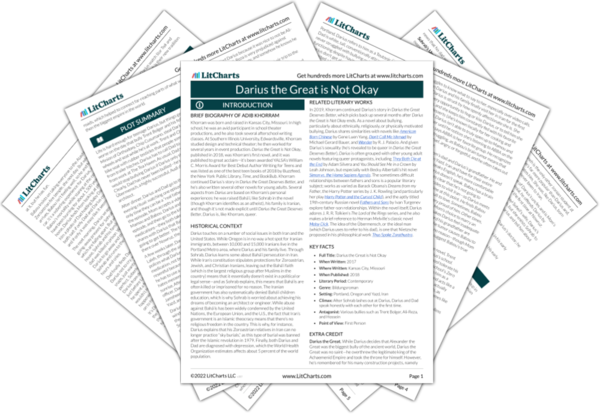Darius the Great is Not Okay follows its titular teenage protagonist as he visits Iran, where Darius’s mom is from, for the first time. Darius is alone and mostly friendless in Portland, but in Iran, he meets his first real friend, Sohrab. The novel presents friendship as something of an antidote to bullying: while Darius is bullied incessantly in Portland, in Iran, he and Sohrab are able to bond over their shared experiences with bullying (Sohrab is bullied for being Bahá’í) and dull some of its worst effects. For instance, Darius used to play soccer, but he quit when he began taking medication for depression and could no longer concentrate on the game. So though Darius believes he’s not good at soccer, Sohrab invites Darius to play with some of his friends—and with Sohrab’s encouragement, Darius discovers that he’s actually pretty good. Additionally, Sohrab shows how supportive friends can make what could be an awful bullying experience mostly positive. Sohrab’s friends, Ali-Reza and Hossein, tease Darius after their first game for being uncircumcised, and they begin calling him “Ayatollah” after Iran’s Supreme Leader (they snicker that Darius’s penis resembles the Ayatollah’s turban). Though this initially devastates Darius, Sohrab manages to turn the nickname into a positive when they play again with younger kids: he tells the younger boys that the nickname is because Darius is in charge. Thanks to Sohrab’s quick thinking, by the end of his trip, Darius thinks he likes the nickname.
The Ayatollah incident in particular highlights for Darius what the novel suggests is one of the most important ingredients to a fulfilling, healthy friendship: trust. Darius trusts Sohrab to stick up for him, so he’s ultimately willing to play soccer again with Ali-Reza and Hossein. And Darius finds that Sohrab is the first person who doesn’t want to change him into someone different. He accepts Darius as he is: American, overweight, depressed, and anxious, and through his words and actions, he shows Darius that it’s okay not to be okay. His friendship with Sohrab helps Darius feel okay for the first time with who he is, suggesting that trusting friendships can, as in this circumstance, help a person feel more secure in their community—and in their own identity.
Friendship ThemeTracker

Friendship Quotes in Darius the Great Is Not Okay
“I love you, maman.”
Grandma and Oma, Dad’s moms, didn’t say that very often. It’s not that they didn’t love me and Laleh, but they were full of Teutonic reserve, and didn’t express affection very often.
Mamou wasn’t like that.
For Fariba Bahrami, love was an opportunity, not a burden.
I swallowed away the lump in my throat. “I love you, Mamou.”

Unlock explanations and citation info for this and every other Darius the Great Is Not Okay quote.
Plus so much more...
Get LitCharts A+I couldn’t eat in front of someone who couldn’t eat with me.
“I’m okay for now. Can we come back after Nowruz? Then we can both have some.”
I thought about that: How back home, all Persians—even Fractional Persians like me and Laleh—were united in our Persian-ness. We celebrated Nowruz and Chaharshanbeh Suri together in big parties, Bahá’ís and Muslims and Jews and Christians and Zoroastrians and even secular humanists like Stephen Kellner, and it didn’t matter. Not really.
Not when we were so few in number.
But here, surrounded by Persians, Sohrab was singled out for being Bahá’í.
He was a target.
And then Sohrab said, “Ayatollah Darioush,” and all three of them laughed.
At me.
I thought I understood Sohrab.
I thought we were going to be friends.
How had I misjudged him so badly?
Maybe Dad was right.
Maybe I would always be a target.
Even for things I couldn’t help. Like being from America. Like having a foreskin.
Those things were normal back home, but not in Iran.
I would never fit in. Not anywhere.
Sohrab glanced at me and turned back to Laleh. “Laleh,” he said. “It’s not polite to do that. Darioush can’t understand you.”
I blinked.
No one had ever made people speak in English around me before.
Not even Mom.
“It’s okay,” I said.
“No,” Sohrab said. “It’s not polite.”
“Sorry, Darius,” Laleh said.
“It’s fine.”
I looked at Sohrab. He squinted at me with his spoon in his mouth.
“Thanks.”
“What I like to do is use oil on my fingers, instead of water,” Dad said. “That way they don’t stick as much. It’s messy, though.”
The Bahrami men nodded in approval.
I wasn’t jealous of him.
Not really.
Maybe Dad’s place had been empty too.
Maybe he’d figured out how to fill it.
Maybe he had.
“I was hurting. And you were there. And I knew how to make you hurt as bad as me.”
He still wouldn’t look at me.
“I’m so ashamed,” he said. “Friends don’t do what I did.”
“Friends forgive,” I said.
“I didn’t mean it, Darioush. What I said. I want you to know.” He finally met my eyes. I’m glad you came. You are my best friend. And I never should have treated you that way.”
I thought about Coach Henderson.
I thought about lack of discipline.
“I guess I didn’t think I was that good.”
“Well, you’ve got some skill. Why don’t you try out in the fall?”
My ears burned. I almost told Coach no.
Almost.
But that’s what Darius would have done.
Darioush would have tried out.
I thought about telling Sohrab that I had made the team. And sending him photos of me in my kit. And him squinting and congratulating me.











